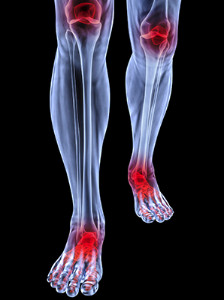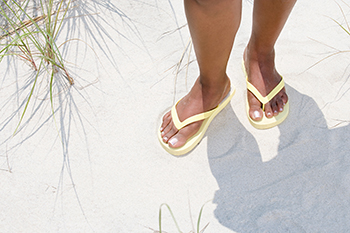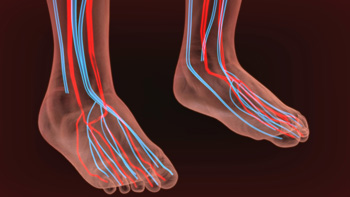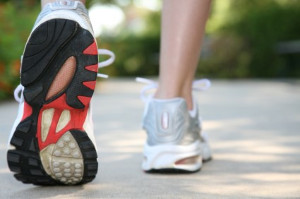 Like other types of arthritis, psoriatic arthritis can cause inflammation and swelling of the joints, including those in the hands and feet. This type of arthritis tends to affect people who have a skin condition called psoriasis. About 5-10% of people with psoriasis also develop psoriatic arthritis. In the feet, this type of arthritis can make the joints feel stiff and painful, and can cause swelling, heat, and redness in the surrounding tissues. Sausage toes, or the medical term known as dactylitis, is a condition that refers to the swelling of an entire toe or finger. This sausage-like appearance happens when the small joints in the toes or hands, as well as the entheses of the surrounding tendons, become inflamed. If you have psoriatic arthritis that affects your feet, it is recommended that you see a podiatrist to help you maintain your foot health.
Like other types of arthritis, psoriatic arthritis can cause inflammation and swelling of the joints, including those in the hands and feet. This type of arthritis tends to affect people who have a skin condition called psoriasis. About 5-10% of people with psoriasis also develop psoriatic arthritis. In the feet, this type of arthritis can make the joints feel stiff and painful, and can cause swelling, heat, and redness in the surrounding tissues. Sausage toes, or the medical term known as dactylitis, is a condition that refers to the swelling of an entire toe or finger. This sausage-like appearance happens when the small joints in the toes or hands, as well as the entheses of the surrounding tendons, become inflamed. If you have psoriatic arthritis that affects your feet, it is recommended that you see a podiatrist to help you maintain your foot health.
Arthritis can be a difficult condition to live with. If you are seeking treatment, contact one of our podiatrists from Riznyk Podiatry. Our doctors can provide the care you need to keep you pain-free and on your feet.
Arthritic Foot Care
Arthritis is a joint disorder that involves the inflammation of different joints in your body, such as those in your feet. Arthritis is often caused by a degenerative joint disease and causes mild to severe pain in all affected areas. In addition to this, swelling and stiffness in the affected joints can also be a common symptom of arthritis.
In many cases, wearing ill-fitting shoes can worsen the effects and pain of arthritis. Wearing shoes that have a lower heel and extra room can help your feet feel more comfortable. In cases of rheumatoid arthritis, the arch in your foot may become problematic. Buying shoes with proper arch support that contour to your feet can help immensely.
Alleviating Arthritic Pain
It is best to see your doctor for the treatment that is right for your needs and symptoms. Conditions vary, and a podiatrist can help you determine the right method of care for your feet.
If you have any questions, please feel free to contact our office located in Orchard Park, NY . We offer the newest diagnostic tools and technology to treat your foot and ankle needs.
 Flip flops are a popular shoe style, and many people enjoy wearing them in the warm summer months. They are constructed with flat, foam soles, and have a plastic or rubber strap that lies between the big toe and second toe. Despite the simplicity of wearing them, they could possibly cause damage to your feet. Bunions can form as a result of pulled and overstretched ligaments, and may cause severe pain and discomfort. Additionally, the majority of flip flops have little or no arch support, and this may cause conditions such as plantar fasciitis and heel spurs to arise. The possible damage that can happen to your feet from frequently wearing flip flops may outweigh the temporary ease that comes from wearing these types of shoes. If you would like more information about how flip flops can affect your feet, please consult with a podiatrist.
Flip flops are a popular shoe style, and many people enjoy wearing them in the warm summer months. They are constructed with flat, foam soles, and have a plastic or rubber strap that lies between the big toe and second toe. Despite the simplicity of wearing them, they could possibly cause damage to your feet. Bunions can form as a result of pulled and overstretched ligaments, and may cause severe pain and discomfort. Additionally, the majority of flip flops have little or no arch support, and this may cause conditions such as plantar fasciitis and heel spurs to arise. The possible damage that can happen to your feet from frequently wearing flip flops may outweigh the temporary ease that comes from wearing these types of shoes. If you would like more information about how flip flops can affect your feet, please consult with a podiatrist.
Flip-flops can cause a lot of problems for your feet. If you have any concerns about your feet or ankles, contact one of our podiatrists from Riznyk Podiatry. Our doctors will assist you with all of your foot and ankle needs.
Flip-Flops and Feet
Flip-flops have managed to become a summer essential for a lot of people. While the shoes may be stylish and easy to slip on and off, they can be dangerous to those who wear them too often. These shoes might protect you from fungal infections such as athlete’s foot, but they can also give you foot pain and sprained ankles if you trip while wearing them.
When Are They Okay to Wear?
Flip-flops should only be worn for very short periods of time. They can help protect your feet in places that are crawling with fungi, such as gym locker rooms. Athlete’s foot and plantar warts are two common fungi that flip-flops may help protect your feet against.
Why Are They Bad for My Feet?
These shoes do not offer any arch support, so they are not ideal for everyday use. They also do not provide shock absorption or heel cushioning which can be problematic for your feet. Additionally, you may suffer from glass cuts, puncture wounds, and stubbed toes since they offer little protection for your feet.
More Reasons Why They Are Bad for Your Feet
If you have any questions, please feel free to contact our office located in Orchard Park, NY . We offer the newest diagnostic and treatment technologies for all your foot care needs.
Corns are small calluses that usually develop on the top of the toes due to friction, usually from the shoes or other toes rubbing against the skin. Though they are small, corns can be painful. Treatment for corns focuses on reducing your pain and discomfort, as well as addressing the underlying cause for the corn’s development. A podiatrist may recommend that you apply a pad around the corn area to keep pressure off of it. Wearing larger, more comfortable shoes with a wider toe box may also help. If more conservative treatment measures fail, surgery may be an option. If you suffer from corns, it is suggested that you see a podiatrist for treatment.
Corns can make walking very painful and should be treated immediately. If you have questions regarding your feet and ankles, contact one of our podiatrists of Riznyk Podiatry. Our doctors will treat your foot and ankle needs.
Corns: What Are They? And How Do You Get Rid of Them?
Corns are thickened areas on the skin that can become painful. They are caused by excessive pressure and friction on the skin. Corns press into the deeper layers of the skin and are usually round in shape.
Ways to Prevent Corns
There are many ways to get rid of painful corns such as:
Treating Corns
Although most corns slowly disappear when the friction or pressure stops, this isn’t always the case. Consult with your podiatrist to determine the best treatment option for your case of corns.
If you have any questions please feel free to contact our office located in Orchard Park, NY . We offer the newest diagnostic and treatment technologies for all your foot and ankle needs.
 Neuropathy is a general term used to indicate damage to the peripheral nervous system. This controls the nerves in the body and is categorized into three groups. Blood pressure and sweat levels are controlled by the autonomic nerves, and the muscles of the body are moved by the motor nerves. The ability to feel cold, heat, or pain are controlled by the sensory nerves. Some of the symptoms that are associated with neuropathy can consist of muscle weakness, a numbing or tingling sensation that is generally noticed in the feet, and a burning or stabbing pain. Patients who are afflicted with diabetes may be prone to developing neuropathy. This may be a result of damage to the nerves that is caused by elevated sugar levels in the blood. It is recommended that you seek the counsel of a podiatrist if you have any of the above symptoms.
Neuropathy is a general term used to indicate damage to the peripheral nervous system. This controls the nerves in the body and is categorized into three groups. Blood pressure and sweat levels are controlled by the autonomic nerves, and the muscles of the body are moved by the motor nerves. The ability to feel cold, heat, or pain are controlled by the sensory nerves. Some of the symptoms that are associated with neuropathy can consist of muscle weakness, a numbing or tingling sensation that is generally noticed in the feet, and a burning or stabbing pain. Patients who are afflicted with diabetes may be prone to developing neuropathy. This may be a result of damage to the nerves that is caused by elevated sugar levels in the blood. It is recommended that you seek the counsel of a podiatrist if you have any of the above symptoms.
Neuropathy
Neuropathy can be a potentially serious condition, especially if it is left undiagnosed. If you have any concerns that you may be experiencing nerve loss in your feet, consult with one of our podiatrists from Riznyk Podiatry. Our doctors will assess your condition and provide you with quality foot and ankle treatment for neuropathy.
What Is Neuropathy?
Neuropathy is a condition that leads to damage to the nerves in the body. Peripheral neuropathy, or neuropathy that affects your peripheral nervous system, usually occurs in the feet. Neuropathy can be triggered by a number of different causes. Such causes include diabetes, infections, cancers, disorders, and toxic substances.
Symptoms of Neuropathy Include:
Those with diabetes are at serious risk due to being unable to feel an ulcer on their feet. Diabetics usually also suffer from poor blood circulation. This can lead to the wound not healing, infections occurring, and the limb may have to be amputated.
Treatment
To treat neuropathy in the foot, podiatrists will first diagnose the cause of the neuropathy. Figuring out the underlying cause of the neuropathy will allow the podiatrist to prescribe the best treatment, whether it be caused by diabetes, toxic substance exposure, infection, etc. If the nerve has not died, then it’s possible that sensation may be able to return to the foot.
Pain medication may be issued for pain. Electrical nerve stimulation can be used to stimulate nerves. If the neuropathy is caused from pressure on the nerves, then surgery may be necessary.
If you have any questions, please feel free to contact our office located in Orchard Park, NY . We offer the newest diagnostic and treatment technologies for all your foot care needs.
 Peripheral artery disease (PAD), a condition characterized by poor circulation to the lower extremities, often has no symptoms. However, when symptoms do become apparent, the first one is usually intermittent claudication. Claudication is a painful type of cramping that occurs in the hips, thighs, or calves when you are walking, climbing the stairs, or exercising. This cramping is caused by too little blood flowing to the lower limbs, and typically goes away when you are at rest. Other symptoms of PAD can include leg pain, poorly healing foot wounds, a decrease in the temperature of your legs compared to the rest of the body, and poor nail and hair growth on the legs. If you are experiencing any of these symptoms, it is suggested that you visit a podiatrist, who can screen you for PAD.
Peripheral artery disease (PAD), a condition characterized by poor circulation to the lower extremities, often has no symptoms. However, when symptoms do become apparent, the first one is usually intermittent claudication. Claudication is a painful type of cramping that occurs in the hips, thighs, or calves when you are walking, climbing the stairs, or exercising. This cramping is caused by too little blood flowing to the lower limbs, and typically goes away when you are at rest. Other symptoms of PAD can include leg pain, poorly healing foot wounds, a decrease in the temperature of your legs compared to the rest of the body, and poor nail and hair growth on the legs. If you are experiencing any of these symptoms, it is suggested that you visit a podiatrist, who can screen you for PAD.
Peripheral artery disease can pose a serious risk to your health. It can increase the risk of stroke and heart attack. If you have symptoms of peripheral artery disease, consult with one of our podiatrists from Riznyk Podiatry. Our doctors will assess your condition and provide you with quality foot and ankle treatment.
Peripheral artery disease (PAD) is when arteries are constricted due to plaque (fatty deposits) build-up. This results in less blood flow to the legs and other extremities. The main cause of PAD is atherosclerosis, in which plaque builds up in the arteries.
Symptoms
Symptoms of PAD include:
It is important to note that a majority of individuals never show any symptoms of PAD.
Diagnosis
While PAD occurs in the legs and arteries, Podiatrists can diagnose PAD. Podiatrists utilize a test called an ankle-brachial index (ABI). An ABI test compares blood pressure in your arm to you ankle to see if any abnormality occurs. Ultrasound and imaging devices may also be used.
Treatment
Fortunately, lifestyle changes such as maintaining a healthy diet, exercising, managing cholesterol and blood sugar levels, and quitting smoking, can all treat PAD. Medications that prevent clots from occurring can be prescribed. Finally, in some cases, surgery may be recommended.
If you have any questions, please feel free to contact our office located in Orchard Park, NY . We offer the newest diagnostic and treatment technologies for all your foot care needs.